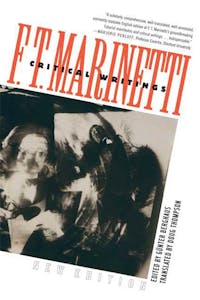Critical Writings
New Edition
 Download image
Download image
ISBN10: 0374531072
ISBN13: 9780374531072
Trade Paperback
584 Pages
$25.00
CA$31.50
The Futurist movement was founded and promoted by Filippo Tommaso Marinetti, beginning in 1909 with the First Futurist Manifesto, in which he inveighed against the complacency of "cultural necrophiliacs" and sought to annihilate the values of the past, writing that "there is no longer any beauty except the struggle. Any work of art that lacks a sense of aggression can never be a masterpiece." In the years that followed, up until his death in 1944, Marinetti, through both his polemical writings and his political activities, sought to transform society in all its aspects. As Günter Berghaus writes in his introduction, "Futurism sought to bridge the gap between art and life and to bring aesthetic innovation into the real world. Life was to be changed through art, and art was to become a form of life."
This volume includes more than seventy of Marinetti's most important writings—many of them translated into English for the first time—offering the reader a representative and still startling selection of texts concerned with Futurist art, literature, politics, and philosophy.
Reviews
Praise for Critical Writings
"The volume compiles writings not previously available in English alongside fresh translations of his better-known works. This is all very nice, but if you're like me, the first thing you want to know when perusing any Marinetti edition is, 'Is the essay about sculpted meat included?' Happily it is."—Philadelphia Weekly
"A splendid new edition . . . The quality of editing here sets new standards for Futurist scholarship . . . The English-language reception of Italian Futurism, and Futurist studies in general, will stand on a firmer footing from now on."—John J. White, Emeritus Professor of German and Comparative Literature, Senior Research Fellow, King's College London
"The critical writings of Marinetti, now made available in English for the first time by Berghaus and Thompson, will be of major value in providing essential primary sources with which to evaluate Futurism's deeper significance as a counterblast to what Walter Benjamin called the Storm of Progress."—Roger Griffin, Professor of Modern History, Oxford Brookes University, and author of The Nature of Fascism
"An accurate, meticulously assembled, three-dimensional portrait of the founder of Italian Futurism. Whereas prior anthologies of Marinetti's writings had limited themselves to the movement's early years, this anthology offers instead a panoramic view, extending from the pre-Futurist period into the second decade of fascist rule. A major contribution to studies of Futurism and the avant-gardes."—Jeffrey T. Schnapp, Professor, Stanford University
"At last! For the first time, we have here a scholarly, comprehensive, well-translated, well-annotated, eminently readable English edition of F. T. Marinetti's ground-breaking Futurist manifestos and critical writings. For teachers and students of the avant-garde, of early twentieth-century art movements, of the role of the new media like radio and cinema, and of the vexed relationship between Futurist aesthetic and Fascist politics, Günter Berghaus's edition will be indispensable."—Marjorie Perloff, author of The Futurist Moment, Professor Emerita Stanford University
"F.T. Marinetti famously claimed to have formulated the tenets of the Futurist movement after walking away from a crashed automobile, a story he detailed in his 1909 manifesto. The founding document of this early 20th-century avant-garde artistic philosophy is one of more than 70 pieces Berghaus (Avant-Garde Performance) gathers in this significant update on the 1972 Selected Writings. This new collection expands upon the body of Marinetti's work available in English, with additional critical writings and manifestos reflecting Marinetti's concepts of literature, theater, film and radio; plus introductory essays and notes that further elaborate the historical and cultural context. Futurism called for no less than a modernist aesthetic revolution that would overturn the traditionalist cultural establishment and mirror the era's technological progress. But it also had a complex stance toward feminism and was violent and militaristic, celebrating WWI as a way to rid Europe of its accumulated history. Though these essays bring Futurism's nationalist leanings into sharp focus, Marinetti's 1918 coalition with Mussolini was brief, and by 1939 Fascism had effectively shut down the movement. This thorough collection will interest scholars of Italian history, art history and theater."—Publishers Weekly
Reviews from Goodreads
BOOK EXCERPTS
Read an Excerpt
The Pre-Futurist Years (1876–1908)
Marinetti was born in Alexandria, Egypt, and received an education based on the arts and humanities at a French college. He became entirely bilingual and from an early age was a prolific writer...


